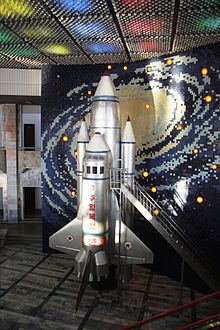| Mangyongdae Children's Palace | |
 | |
| Korean name | |
|---|---|
| Chosŏn'gŭl | 만경대학생소년궁전 |
| Hancha | 萬景臺學生少年宮殿 |
| Revised Romanization | Mangyeongdae haksaeng sonyeon gungjeon |
| McCune–Reischauer | Mankyŏngtae haksaeng sonyŏn kungjŏn |

The Mangyongdae Children's Palace (or Mangyongdae School Children's Palace) in Pyongyang is a public facility managed by Korean Youth Corps in North Korea where pioneer members can engage in extra-curricular activities, such as learning music, foreign languages, computing skills and sports. It was established on 2 May 1989 and it is situated in Kwangbok (Liberation) Street [de], in the north of Mangyongdae-guyok. It is the largest of the palaces in North Korea dedicated to children's after-school activities. In front of the Children's Palace there are a grand sculpture group and two enormous fountains, rising 90 and 100 metres.
The Mangyongdae Children's Palace has 120 rooms, a swimming pool, a gymnasium and a 2,000-seat theatre. The Mangyongdae Children's Palace is not to be confused with the Pyongyang Children's Palace [ko] situated in the north of the Kim Il-sung Square and founded in 1963.
See also
References
- "North Korea Music — Children's Palace". KTG North Korea Travel.
- "Pyongyang". VNC Asia Travel. Archived from the original on 24 July 2011. Retrieved 2 January 2011.
Further reading
- O, Hae Yon (2016). Mangyongdae Schoolchildren's Palace. Pyongyang: Foreign Languages Publishing House. OCLC 1033338063.
External links
- Mangyongdae Children's Palace footage from the official North Korean Tourism DVD on YouTube
- Steps for Cultural Diplomacy by Kim Laskowski at Juilliard.edu
- Mangyongdae Schoolchildren's Palace picture album Archived 4 March 2016 at the Wayback Machine at Naenara
39°00′50″N 125°39′32″E / 39.01389°N 125.65889°E / 39.01389; 125.65889
This North Korea school-related article is a stub. You can help Misplaced Pages by expanding it. |